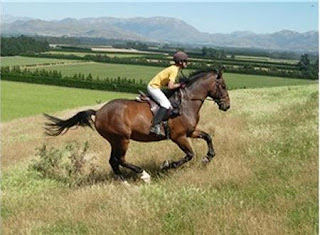Not everyone is able to include different types of exercise in their horses routine but if you can then there are benefits. Different types of exercise will help develop and fitten a horse in different ways. To see a basic fitness routine have a look at my blog. To find out more read on ....
Advantages of walking.
This is an essential part of any fitness programme. However, you must walk on with energy, balance and rhythm. Pottering along will not have the same effect as a good forward going, swinging walk. You must also be careful though, not to hurry your horse out of his own rhythm! If you walk on good level ground you will be toning your horses tendons, ligaments and muscles. Walking does not stress the rest of the horse's systems (eg: respiratory) and will help to build stamina. As the muscles contract and relax they are also encouraging good circulation.
Advantages of trotting.
Again on a level surface this will further strengthen tendons, ligaments and muscles. The trot again needs to be a forward going and balanced pace with a good rhythm. Keep an eye out for a future blog on muscles to explain how this work makes them more efficient! Don't be tempted to shorten the walking phase in a fitness routine as trotting too soon can cause damage to the horse's legs.
Advantages of cantering.
When you reach the cantering stage of your fitness programme you are ready to increase the cardio-vascular workout. Cantering helps to increase stamina and tones up tendons, ligaments and muscles. Pay attention to the ground as cantering on hard ground can cause injury and damage to the tendons, ligaments, muscles and bones.
Advantages of galloping.
Useful for assessing the level of fitness, judged by the time it takes the horse to recover. Galloping requires extra effort and tests the cardio-vascular fitness. Short gallops are also known as 'pipe openers'. As with cantering ensure the ground is suitable before galloping.
Advantages of hill work.
Going up hills requires more effort than work on the flat, whatever pace you are working in. Therefore you are again building up the heart and lungs . You will also be improving your horses balance when going up or down the hills. Going up a hill will help the horse bring his hindquarters underneath and so help develop and strengthen these muscles.
Good to be used in the first stages of a fitness programme to add interest. Walking around in a school can be boring for horse and rider. The tarmac roads will also help the legs (ie: tendons, ligaments, muscle and bone) to strengthen. Hacking out is good throughout a fitness programme and to be used regularly for exercise. Helping to keep the horse fresh and interested it gives the horse more to look at and a different perspective. It will also help the horse get used to different situations and give the opportunity for some good canters and perhaps gallops.
Giving you the opportunity to improve your horse's way of going and discipline. Useful for teaching them to move away from your leg and to turn, slow and halt on request. Some horses enjoy working in the school as it gives them something to think about. It allows you to try new things in a safe and secure environment. You must, at each pace, aim for calmness, forward movement and straightness.
Advantages of lunging.
Not to be used until the horse has reached a certain level of fitness due to the strain it can put on a horse's tendons, ligaments and muscles. The horse works harder when lunged than when being schooled or hacking out and so shorter periods of work are required. This adds variety and allows the horse to work without a rider on his back. This often allows them to stretch and relax more.
Have you seen this week's video 'My Stables - Tour' on my You Tube channel.
Horse Life and Love. Please check it out and SUBSCRIBE.
You can also follow me on Facebook and Instagram for updates on Chesney, Basil, Tommy and Daisy.
Until next time!
Jo




No comments:
Post a Comment